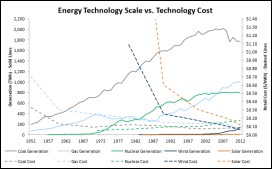by Brianna Crandall — May 28, 2014—The U.S. Partnership for Renewable Energy Finance (US PREF), a program of the nonprofit American Council On Renewable Energy (ACORE), recently released a white paper entitled “Renewable Energy Finance, Market and Policy Overview” that aggregates the numerous policy mechanisms affecting renewable energy projects in the United States and provides an analysis of the impact these policies have had on private sector investment in the industry. The white paper also looks at innovative financing mechanisms the industry has recently developed including Securitization, YieldCos, and Green Bonds.
“In the past 10 years, over $300 billion has been invested in the U.S. renewable energy sector,” stated Michael Brower, CEO of ACORE. “This investment has had a significant impact on economic development in the U.S., creating hundreds of thousands of jobs in the sector.”

In the past 10 years, over $300 billion has been invested in the U.S. renewable energy sector, as shown on this graph provided by ACORE.
(Click on image to enlarge)
“Federal tax policy has worked, stimulating strong private investment in the past several years and significant system cost reduction, with wind down 43% and solar down 80% since 2008,” stated Todd Foley, SVP for policy and government relations at ACORE. “However, lack of policy certainty puts new investment and market momentum at risk.” While capital markets are strong, new investment in renewable energy fell by over 33% from 2011 to 2013, signaling a significant amount of private capital that has been sidelined as a result of an uncertain market.
Despite this policy uncertainty, the industry has developed important finance innovations including the YieldCo, Green Bond, and Securitization finance structures. A successful YieldCo, NRG Yield, Inc., raised almost $431 million in its initial public offering in July 2013, notes US PREF. NRG Yield is a unit of NRG Energy Inc. with 1.3 GW of solar and wind generation. The PREF analysis provides success stories and further details on all three of these mechanisms.
“The success of the YieldCo, Green Bond, and Securitization structures shows the resiliency of the renewable energy finance market,” stated Timothy Kemper, US PREF member and national co-leader for the Renewable Energy Industry Practice at CohnReznick. “New finance structures, coupled with policy certainty, will enable a strong, diverse market to see increased private-sector investment and growth in U.S. renewable energy infrastructure in the coming years, contributing to economic development and job creation.”

Thanks to policies that have driven investment, and therefore industry growth, both wind and solar PV have reduced their respective equipment costs over the past four years by some 43% and 80% respectively. Source: Hudson Clean Energy Partners Analysis
(Click on image to enlarge)
US PREF, a program of ACORE, is a coalition of senior level financiers who invest in all sectors of the energy industry, including renewable energy. Members educate the public sector to assure renewable energy finance legislation impacts the market as efficiently and effectively as possible, with the goal of helping to unlock capital flows to renewable energy projects in the United States.
In a related development, shortly after the release of the paper, ACORE issued a press release in response to legislation introduced to establish a federal Green Bank. “The task of scaling up renewable energy across the nation requires access to significant amounts of capital, and we couldn’t be more pleased with Rep. Chris Van Hollen’s leadership in introducing legislation to establish a federal Green Bank,” said Michael Brower, ACORE’s President and CEO. “The establishment of a federal Green Bank will leverage private capital and ingenuity, bringing additional investment, energy infrastructure and jobs to the U.S.”
“A federal Green Bank will complement other clean energy policies by providing financial products that can address market barriers currently limiting private sector capital flows into otherwise attractive renewable energy and energy efficiency projects,” explained Todd Foley, ACORE’s Senior Vice President for Policy and Government Relations. “We look forward to working with Rep. Van Hollen, other members of Congress, state leaders and the private sector to increase access to lower-cost financing.”





